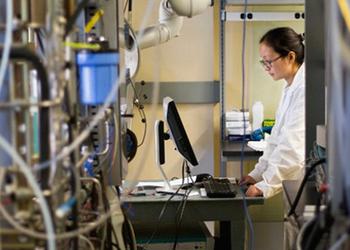
ANN ARBOR, Michigan, October 16, 2013 (ENS) – Ford Motor Co., the state of Michigan and the University of Michigan are teaming up to establish a unique $8 million battery lab at the university’s Energy Institute.
The new facility for prototyping, testing, and analyzing batteries and the materials that go into them is expected to accelerate development of Michigan’s battery supply chain and enable rapid progress toward climate-friendly transportation.
Located near the U.S. automotive capital in Detroit, the new lab will bring together materials scientists and engineers, as well as suppliers and manufacturers, to ease a bottleneck in battery development.

Ted Miller, who manages Ford’s battery research, said, “We need to be able to test hundreds of chemistries and cell designs, but they have to be tests that can translate from the lab to the production line.”
“Ford has battery labs that test and validate production-ready batteries, but nothing this far upstream,” said Miller. “This is sorely needed and no one else in the auto industry has anything like it.”
The analysis systems will be able to measure a battery while it’s running to determine how well it performs under expected operation. Measurements such as strain and temperature can identify mechanical and heat management issues that could decrease the battery’s performance and shorten its life.
Developers will also be able to do detailed post-testing analysis, revealing changes to the battery’s chemical microstructure after operating.
Prototyping is expected to be a big draw for scientists and automotive engineers.
“The battery prototyping facility at the U-M Energy Institute will be a valuable resource for our automotive industry going forward,” said Nigel Francis, MEDC senior vice president, automotive, and senior automotive advisor to Michigan Governor Rick Snyder.
Energy storage is a limiting technology for vehicles powered by batteries. The new lab will enable the development of cost-effective, light-weight, high-energy-density batteries.
“This kind of collaboration is essential to addressing complex challenges like sustainable energy and efficient transportation. I want to thank our campus leaders, MEDC and Ford for having such a singular focus on developing solutions to such challenging energy issues,” said University of Michigan President Mary Sue Coleman, announcing the establishment of the new lab on Monday.
University of Michigan is the home of the nation’s premiere automotive engineering program. Researching electric and other advanced clean propulsion systems is a major focus that includes close interaction with motor vehicle, energy and petrochemical industries.
The new battery lab will be available for any company to use. It will allow students to utilize state-of-the-art equipment while working closely with experts.
The Energy Institute envisions the new facility as a safe zone for non-competitive collaboration.
“This is open innovation,” said Mark Barteau, director of the U-M Energy Institute. “I believe that cooperation between university researchers and industry is essential to create advances that have real-world impact.”
Copyright Environment News Service (ENS) 2013. All rights reserved.
